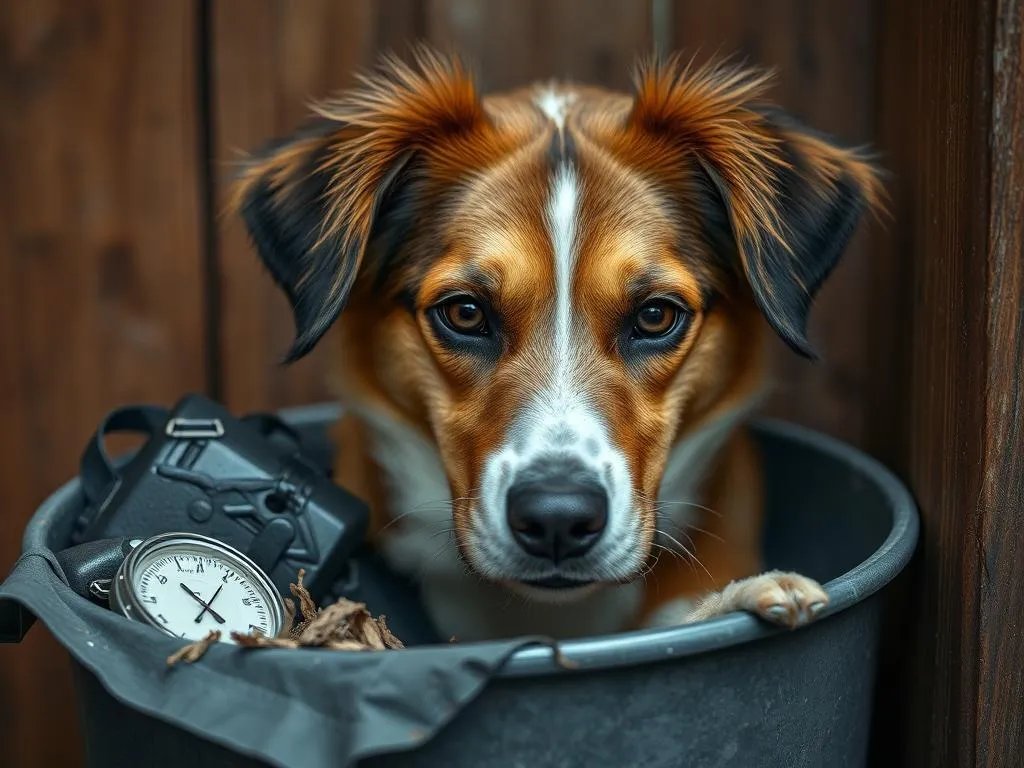
Introduction
Many dog owners face the common nuisance of discovering their furry friends have rummaged through the trash. This behavior, often humorous in hindsight, can be perplexing and frustrating. Understanding why does my dog get into the trash is crucial for pet owners looking to prevent this behavior. Dogs are naturally curious creatures, and their inclination to explore their environment includes investigating what we may consider off-limits.
In the following sections, we will delve into the instinctual nature of dogs, explore various reasons for this behavior, recognize signs that indicate trash diving, and discuss effective prevention strategies. By the end, you will have a comprehensive understanding of why your dog finds the allure of the trash can irresistible.
Understanding Dog Behavior
The Instinctual Nature of Dogs
Dogs have retained many instincts from their wild ancestors, including scavenging and foraging. These instincts are deeply ingrained and are crucial for their survival in the wild. In nature, dogs would scavenge for food to survive, often rummaging through whatever they could find. This instinctual behavior is a significant factor in understanding why does my dog get into the trash.
The Role of Curiosity in Dogs
Curiosity is another driving force behind a dog’s behavior. Dogs are naturally inquisitive animals, eager to explore their surroundings. This curiosity can lead them to investigate areas that might not be safe or appropriate, such as trash cans. Whether it’s the smell of discarded food or the intriguing noise of crinkling wrappers, a dog’s innate desire to explore can manifest in various behaviors, including trash diving.
Reasons Why Dogs Get into the Trash
Hunger and Diet
One of the primary reasons your dog might be diving into the trash is hunger. If a dog feels that their nutritional needs are not being met, they may turn to alternative food sources, including your garbage. Signs that your dog may be underfed or not satisfied with their diet can include persistent begging, weight loss, or scavenging behaviors.
Boredom and Lack of Stimulation
Boredom is another significant factor that can lead to destructive behaviors, including trash diving. Dogs require mental and physical stimulation to remain happy and healthy. Without adequate exercise or engaging activities, they may resort to exploring the trash as a form of entertainment. To keep your dog mentally and physically stimulated, consider incorporating regular walks, interactive play, or puzzle toys into their daily routine.
Attention-Seeking Behavior
Dogs are social creatures that thrive on interaction with their owners. Some dogs may get into the trash as a way to attract attention, even if that attention is negative. If you react strongly when you catch your dog in the act, you may inadvertently reinforce this behavior. Understanding that trash diving can be a form of attention-seeking behavior is essential in addressing it effectively.
Anxiety and Stress
Anxiety and stress can also drive dogs to engage in trash diving. Dogs with separation anxiety or those affected by environmental stressors, such as loud noises or changes in their routine, may seek comfort in food, leading them to raid the trash. Identifying the root cause of your dog’s anxiety is crucial in addressing this behavior and ensuring their overall well-being.
Recognizing the Signs
Common Behaviors Associated with Trash Diving
Before your dog actually dives into the trash, certain behaviors may signal their intent. These can include sniffing around the trash can, pawing at it, or hovering nearby with a guilty expression. Recognizing these signs can help you intervene before the mess occurs.
Impact of Trash Diving on Dog Health
While it may seem like a harmless habit, trash diving can pose significant health risks for dogs. They may ingest harmful items such as bones, toxic foods, or cleaning supplies. Signs of distress or illness resulting from trash diving can include vomiting, diarrhea, or lethargy. Being vigilant about what your dog can access is vital for their health.
Prevention Strategies
Proper Waste Management
One of the most effective ways to prevent trash diving is through proper waste management. Securing trash cans with lids that are difficult for dogs to open is a straightforward solution. Consider investing in dog-proof trash bins specifically designed to deter curious pets. Additionally, placing trash cans in cabinets or areas that are inaccessible to your dog can significantly reduce their chances of getting into the trash.
Providing Adequate Nutrition
Ensuring your dog receives adequate nutrition is essential in curbing trash diving behavior. Consult with your veterinarian to determine the best diet for your dog’s specific needs. High-quality dog food can help satisfy their hunger and reduce the temptation to scavenge for food in the trash.
Increasing Exercise and Mental Stimulation
Increasing your dog’s physical activity and mental stimulation can significantly reduce boredom-related behaviors, including trash diving. Regular walks, playtime, and engaging in activities that challenge your dog mentally, such as obedience training or interactive toys, can keep their minds occupied.
Training Techniques
Training is a vital aspect of preventing trash diving. Using positive reinforcement techniques can redirect your dog’s behavior away from the trash. Consider teaching commands like “leave it” or “no” when they approach the trash can. Rewarding them for following these commands helps them learn acceptable behaviors.
When to Seek Professional Help
Recognizing Severe Behavioral Issues
If your dog’s trash diving behavior escalates or appears to be a symptom of a larger problem, it may be time to seek professional help. Signs that indicate a more serious issue can include excessive scavenging, aggression over food, or persistent anxiety.
Finding a Qualified Trainer or Behaviorist
When seeking professional help, it’s essential to find a qualified trainer or behaviorist. Look for professionals with experience in dog behavior and training. During consultations, expect to discuss your dog’s specific behaviors and receive tailored advice on how to address trash diving and other related issues.
Conclusion
Understanding why does my dog get into the trash can help you take proactive steps to prevent this behavior. By recognizing the instinctual nature of dogs, addressing their nutritional and emotional needs, and implementing effective prevention strategies, you can reduce the likelihood of your dog raiding the trash.
Observing your dog and engaging with them in positive ways will not only improve their behavior but also enhance their overall well-being. With patience and understanding, you can foster a healthier environment for your furry friend, ensuring they have the stimulation and care they need to thrive.









